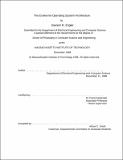The exokernel operating system architecture
Author(s)
Engler, Dawson R
DownloadFull printable version (604.4Kb)
Advisor
M. Frans Kaashoek.
Terms of use
Metadata
Show full item recordAbstract
On traditional operating systems only trusted software such as privileged servers or the kernel can manage resources. This thesis proposes a new approach, the exokernel architecture, which makes resource management unprivileged but safe by separating management from protection: an exokernel protects resources, while untrusted application-level software manages them. As a result, in an exokernel system, untrusted software (e.g., library operating systems) can implement abstractions such as virtual memory, file systems, and networking. Themain thrusts of this thesis are: (1) how to build an exokernel system; (2) whether it is possible to build a real one; and (3) whether doing so is a good idea. Our results, drawn from two exokernel systems [25, 48], show that the approach yields dramatic benefits. For example, Xok, an exokernel, runs a web server an order of magnitude faster than the closest equivalent on the same hardware, common unaltered Unix applications up to three times faster, and improves global system performance up to a factor of five. The thesis also discusses some of the new techniques we have used to remove the overhead of protection. Themost unusual technique, untrusted deterministic functions, enables an exokernel to verify that applications correctly track the resources they own, eliminating the need for it to do so. Additionally, the thesis reflects on the subtle issues in using downloaded code for extensibility and the sometimes painful lessons learned in building three exokernel-based systems.
Description
Thesis (Ph.D.)--Massachusetts Institute of Technology, Dept. of Electrical Engineering and Computer Science, 1999. Includes bibliographical references (p. 115-120). This electronic version was submitted by the student author. The certified thesis is available in the Institute Archives and Special Collections.
Date issued
1999Department
Massachusetts Institute of Technology. Department of Electrical Engineering and Computer SciencePublisher
Massachusetts Institute of Technology
Keywords
Electrical Engineering and Computer Science